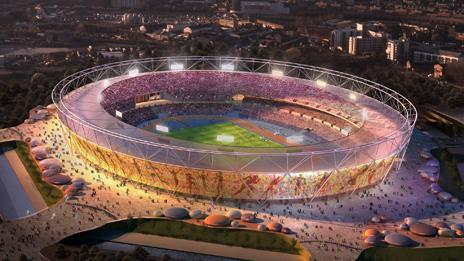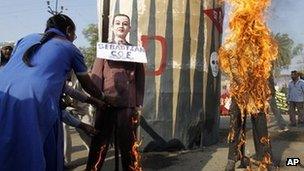London 2012: Dow Chemical in Olympics sponsorship row
- Published

The wrap - as shown in a computer image above - is designed to display moving images and to minimise crosswinds inside the Olympic stadium
Dow Chemical has said it is not considering withdrawing its sponsorship of the London 2012 Olympics, despite a furore over its involvement.
The world's second largest chemical manufacturer is funding a £7m fabric wrap for the Olympic stadium in east London. The wrap will be 900m (0.56 miles) long and 20m (67ft) high.
In 1999, Dow merged with the Union Carbide Corporation, whose subsidiary Union Carbide India ran the Bhopal pesticide plant - the site of one of the world's worst industrial disasters in December 1984.
Campaigners say the chemical gas leak and its fallout have killed 25,000 people, and that local people continue to be affected.
Dow has said Union Carbide's £288m ($470m) settlement for those affected by the tragedy - which was paid in 1989 - is fair and final, but the controversy shows no sign of abating.
Rights groups, athletes and Indian and British politicians have joined those calling for the company's sponsorship to be shelved.

Bhopal protesters burned an effigy of Lord Coe on the 27th anniversary of the disaster
Here is a timeline of developments:
19 December 2011: Games organisers Locog confirm the £7m fabric wrap around the 2012 Olympic Stadium will not feature Dow's branding, but the company insists this decision was taken during the summer, and not influenced by protests against its refusal to pay compensation to Bhopal victims.
While under strict IOC "clean venue" rules, no company is allowed to advertise during the period of the Games, Dow had had the option of featuring its branding on five "test panels" before the event.
"In mid-summer, Locog and Dow discussed Dow deferring the rights to these five panels to allow free and full execution of the design as determined by Locog," a Dow spokesman told the BBC.
7 December 2011: Dow says it is not considering withdrawing its sponsorship, despite the furore. "We are committed to our partners and a successful London 2012 Games," a spokeswoman tells the BBC. "We will continue to provide our sustainable solutions, including the Olympic stadium wrap.
"Dow never owned nor operated the Bhopal plant and the settlement of the incident occurred in 1989, long before Dow acquired Union Carbide...
"While it is understandable that human emotions evoked by the tragedy remain, allowing a misrepresentation of facts and to rewrite history - as some are trying to do - is not only wrong but sends an unfortunate and inaccurate message that obscures rather than clarifies the Bhopal tragedy."
5 December 2011: India's government instructs its Olympics officials to raise the issue of Dow Chemical's Olympic sponsorship with London 2012 organisers.
2 December 2011: An effigy of London 2012 chairman Lord Coe is burnt in protest against Dow Chemical's sponsorship. The effigy is burned along with that of Vijay Kumar Malhotra, the acting president of the Indian Olympic Association (IOA), as scores of Bhopal protesters mark the 27th anniversary of the disaster.
28 November 2011: The Indian Olympic Association says there is "no question" its athletes will boycott London 2012 as a result of the row over Dow's sponsorship. Madhya Pradesh Chief Minister Shivraj Singh Chauhan - in whose state Bhopal lies - had called for Indian athletes to stay away unless the organisers ended Dow's sponsorship deal.
15 November 2011: London 2012 chairman Lord Coe defends the role of Dow in providing the stadium wrap.
4 August 2011: It is announced that Dow is to fund and make the fabric stadium wrap. Under IOC rules, no company is allowed to advertise at any Olympic venue from a month before the Games start until the end.
11 May 2011: India's Supreme Court rejects a request to re-open the 1984 Bhopal gas disaster case in order to impose harsher sentences on the accused.
8 February 2011: London 2012 organisers Locog say plans for the stadium wrap will go ahead, but with private rather than government funding.
3 December 2010:India seeks to more than double to $1.1bn (£700m) the compensation paid for the 1984 Bhopal gas disaster. On the 26th anniversary of the disaster, the attorney general's office files a case at the Supreme Court to increase the $470m settlement reached between the Indian government and Union Carbide in 1989.
2 November 2010: London 2012 chairman Lord Coe describes the scrapping of the wrap as a "sensible" cost-cutting idea.
July 2010: Dow is announced as part of The Olympic Partners Programme (TOP), becoming the official "chemistry company" of the Olympic Movement in partnership with the International Olympic Committee (IOC) and National Olympic Committees until 2020.
24 May 2010: Public funding for the £7m wrap is removed as part of the government's Comprehensive Spending Review, in which the UK government announces that £27m is to be cut from the 2012 London Olympic budget., external The Department for Culture, Media and Sport says the wrap can not be justified in the current economic climate, but that the idea may be revived if a sponsor can be found.
22 May 2008: Building work begins on London's £496m Olympic stadium, external, three months ahead of schedule.
9 September 2004: The Olympic Park, crucial to London's 2012 bid, is given the go-ahead, external.
- Published5 December 2011
- Published2 December 2011
- Published28 November 2011
- Published15 November 2011
- Published8 August 2011
- Published4 August 2011
- Published8 February 2011